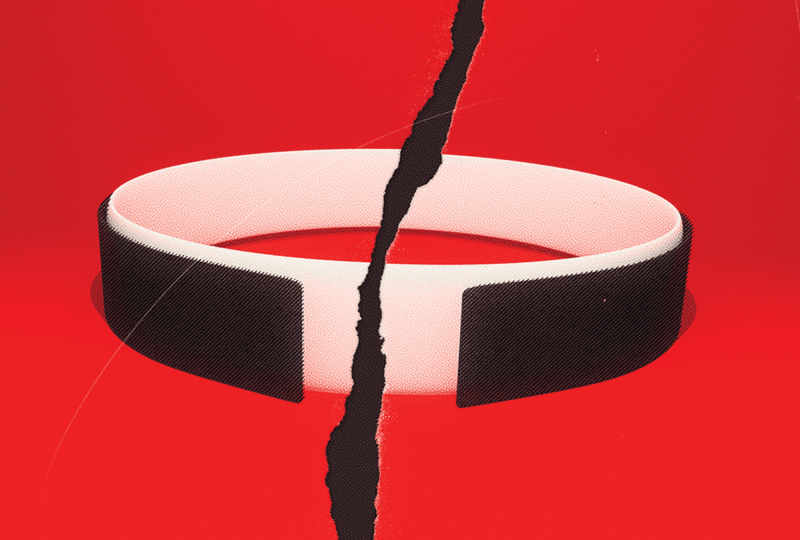CERTAINTY IS A rare thing in the age of the coronavirus. But there is one thing that we can know for sure: There will be fewer pastors after the pandemic than there were before it. For me, the realization started with reports from friends and colleagues, all gifted and committed pastors, sharing their decision not only to step down from their church but from ministry altogether. This is not an uncommon reality, but the number of reports caught my attention. I was used to hearing this kind of news a few times a year. Now, it was a few times a month.
My observations were reinforced by data. A survey conducted by the Barna Group discovered that toward the end of 2021, 38 percent of pastors had given real and serious consideration to stepping down from ministry permanently. That number was up 9 full percentage points from earlier that same year, meaning that if the trend has held steady, the percentage is likely even higher today.
Then, in the middle of 2021, I felt it in myself: a deep weariness that I had never experienced before, even when I pastored a church while my wife fought cancer. There was a sense of despair as I faced decision after decision that would invariably lead to controversy and criticism: Masks or no masks? Open our doors or close them? How do I navigate social issues in a way that is courageous yet pastoral? I felt trapped between the very real needs of my congregation and a very virulent pandemic that today has killed more than 1 million Americans. I had become part of that 38 percent.
The ‘Great Pastoral Resignation’
WHILE STILL AN unfolding dynamic, it is not too early to imagine how the dearth of pastors might shape the future of ministry and churches. After all, prophecy, or casting our eyes to the future, has always been a key practice of the church. (The prophetic tradition, of course, wasn’t just future-oriented: Prophets also confronted poverty, war, despotism, and oppression.) What broader ramifications could the “Great Resignation,” which has impacted industries across the U.S., have on churches? Probably more than we recognize. Much more.
july_chin_spot_a.png

There will be fewer pastors after the pandemic; that is all but certain. But this trend shouldn’t be viewed in isolation. It must be considered in conjunction with other powerful and interconnected dynamics. Americans in general are less interested in organized religion than ever before. Studies are unanimous in this assessment, whether measuring church attendance or church membership or any other factor. There aren’t just fewer pastors. There are fewer people who are interested in organized faith.
This dynamic is even more pronounced among younger generations. A Gallup poll conducted in 2020 discovered that while Americans belonging to a church, synagogue, or mosque had fallen below 50 percent for the first time, the percentage of millennials was a full 30 percentage points lower than those born before 1946. In the Barna study, while 38 percent of pastors said they considered quitting in 2021, among pastors under the age of 45, that number rose to 46 percent. This means that what we are seeing now is not just a present reality, but one that will likely accelerate in the future.
If there are to be fewer pastors and fewer people interested in organized religion, it will almost certainly mean fewer churches as well. Before the pandemic, smaller churches with dwindling congregations were closing their doors at an accelerated rate and fewer new churches were being planted, a one-two punch captured by a Lifeway study on Protestant churches based on data collected in 2014 and 2019. With fewer pastors to lead, this preexisting dynamic will only accelerate.
That is not the end of the possible reverberations. Fewer pastors will lead to fewer churches which will, in turn, lead to fewer church buildings. This has already begun across the nation as church buildings, long an anchor point of many American neighborhoods, are sold, remodeled for other purposes, or demolished altogether. The construction of new church buildings has crawled to a standstill. This will alter the very physical footprint of our communities.
Seminaries, already struggling to remain open, will be profoundly affected. They have long served as important outposts of the Christian faith that straddled the academic and the spiritual realms. But the main population that they serve—and draw income from—are people who feel called to vocational ministry, a pool that was already small to begin with but is getting smaller still. Almost all seminaries will face this challenge, and some will close. Some already have due to dwindling enrollment numbers.
Denominations similarly will feel the ground shifting beneath their feet. As reflected in a Pew Research study from 2019, both mainline and Protestant denominations had already seen steady declines over the past decade, but it will get worse. With fewer congregants and churches, their operations and influence will diminish—offices will close, properties will be sold, and conferences consolidated, all in an effort to circle the wagons against the coming storm. But it won’t be enough. Denominations will have nowhere near the same status they had a generation ago. In essence, when other compounding cultural shifts are considered, the mass resignation of pastors could fundamentally change the landscape of American Christian faith as we know it.
While this is of course conjecture, I don’t think this picture is unrealistic. It reflects numerous preexisting trends and aligns with what many others are predicting. It is also consistent with what I and others have already seen in the Pacific Northwest, which has long had a low degree of religious identification: fewer pastors, fewer people interested in organized faith, fewer churches, and all its resulting fallout. This could very well be a prophecy of what the rest of the American church looks like in a few short years.
Disrupting the institution
PROPHECY IS NOT just the practice of predicting the future. It is also the practice of speaking into it, of using our prophetic imagination to shape what is to come through the beauty of the gospel and the power of the Holy Spirit. So how do we reimagine this impending reality through those transformative lenses? By remembering that something that disrupts the institution of the church may not necessarily be a bad thing for the body of Christ.
Yes, the coming dynamics will likely upend institutional Christianity as we know it. The exodus of pastors, together with other cultural factors, may herald a sea change in the Christian landscape of this nation. Many will surely see these titanic shifts as catastrophes—postmodernism’s final death blows to the Christian faith as we have come to know it.
july_chin_spot_b.png

But Jesus told the Apostle Peter that the foundations of the church would be built upon a rock so firmly rooted that even the gates of hell would never prevail against it. If this is true, even during tumultuous periods when the practices and paradigm of church are profoundly disrupted, the true nature of the church cannot be touched because it is built upon Christ himself. To assume otherwise is to overemphasize the power of our circumstances and to underemphasize the power of Jesus.
A good example of this comes from the book of Acts. The early church at that period is flourishing as people witness the kingdom of God being revealed through the power of the Holy Spirit. They are captivated by a community that looks nothing like any the world has ever seen—a community that loves former enemies and where the wealthy share so that not one person is in need—a glimpse of heaven on earth.
But then comes a disruption, one that makes our own season of “disruption” look like a flea bite: The believers are rounded up by religious authorities, charged with blasphemy against God, and forced to flee their homes. The beautiful little seed of the church is scattered before it can take root, marking the end of the church.
But, of course, that is not what happens. Despite this disruption of the worst kind, it accomplishes nothing except to spread the church even further—first into Africa through a disabled Ethiopian official, then most likely to Europe through the faith of Lydia, a cloth dyer. Nothing could disrupt the church because it is Christ who is the foundation.
We are facing a season of disruption—it has been coming, and it is already upon us. It will dismantle many of the assumptions that we have become accustomed to as believers in this nation. But having faith that Christ is the solid rock of the church allows us to look at that situation and then reimagine it and see it in a far different light: as a correction. And an opportunity.
Pastoring the future
YES, THERE WILL be fewer pastors—that singular vocation that has become nearly synonymous with the church itself. As a pastor who has many friends in ministry, this grieves me deeply. But perhaps it is not necessarily a bad thing.
Pastors are often saddled with broad and unsustainable expectations: to teach, counsel, comfort, manage, catalyze, discipline, mop—you insert the verb, and there is someone in the church who expects the pastor to do it. The resignation of pastors isn’t just about the pandemic. It’s about an unhealthy paradigm of pastoring that predated the pandemic.
Perhaps this disruption is an opportunity for the church to shift to a healthier model, one where more people use their God-given gifts to do what a single person was erroneously expected to accomplish alone, like a group of gardeners who tend to a garden’s health together. Fewer pastors does not necessarily mean fewer churches if more people in the church play a greater role in maintaining the health of the community.
Pastors can continue to have a role of real significance but not one of dominance or one saddled with unhealthy and lopsided expectations. Yes, pastoral ministry would look fundamentally different as a result, less a singular vocation and more an equal member of a community. But is that not what Christ had always intended for the church: not to be led by a priest but to be led by the priesthood of all believers?
There may be fewer church facilities, those beautiful sanctuaries that have been members of our neighborhoods for generations. This too is lamentable. I cannot help but shudder to imagine the vaulted ceilings of sanctuaries becoming expensive lofts for tech bros. But the church is not a building. From its earliest moments, the church has never needed something as temporary as four walls to define it or contain it. Why should we? Moreover, we should acknowledge that owning a building is a double-edged sword, in some ways an anchor and in some ways a burden. It provides a space from which we can do ministry, but it requires money to own and maintain. Being released from those obligations, churches’ efforts and wealth could be refocused on spreading the gospel and serving the poor instead of edging the lawn and refurbishing the lobby with updated furniture.
chin_cover.png

Buildings can then be released back to the community to provide affordable housing or places of employment. Or imagine this: If a church gave their land back to the First Peoples who cared for it for millennia and instead chose to meet wherever they could, it could be a declaration of our identity as exiles and sojourners in this world who, like Jesus, have no home in this world. Having fewer pastors would affect seminaries, those storied institutions that have provided biblical training and academic accreditation to those called to ministry. But does having fewer pastors mean that there are fewer people to train for ministry? By no means. Seminaries could pivot alongside the shifts that are happening in churches, supporting not just the few individuals who have received the calling to be a pastor but every member of the church in their calling. Not only would seminaries become more of a resource for the entire church body, but they would also dramatically multiply the number of people they could potentially serve. To do this they may have to step away from the academic model that they have tried to emulate from the world, but perhaps that is for the best. They could equip all the gardeners that tend to the life of the garden, rather than maintaining an ivory tower that supports only a few.
There will be a cost. I don’t think we should diminish the inevitable grief many will experience as cherished aspects of church fade in significance. We will likely not have the same privileged standing in society that we have enjoyed for so long. We may experience the opposite. We may no longer be trendsetters and cultural icons who enjoy an outsized influence. We may no longer bend the ear of presidents or play kingmaker in American politics. This will be a change, but it may be for the best. After all, we already have a King.
Disruption is coming. Like all disruption, it will not be pleasant. But as we step foot into this new reality, it is our faith in Jesus that will allow us to discern God’s handiwork even in the chaos around us. God is not punishing us with this disruption. God is preparing us. God is stripping us of the tools that we have come to love because they will no longer have any use where we are going. God is like a winemaker exchanging the old wineskins for new. A winemaker doesn’t do so with malice, or with disdain for the old skins. She does so knowing that they cannot contain the new wine that is coming.
The winemaker is calling us. Let us go and receive our new wineskins.

Got something to say about what you're reading? We value your feedback!







